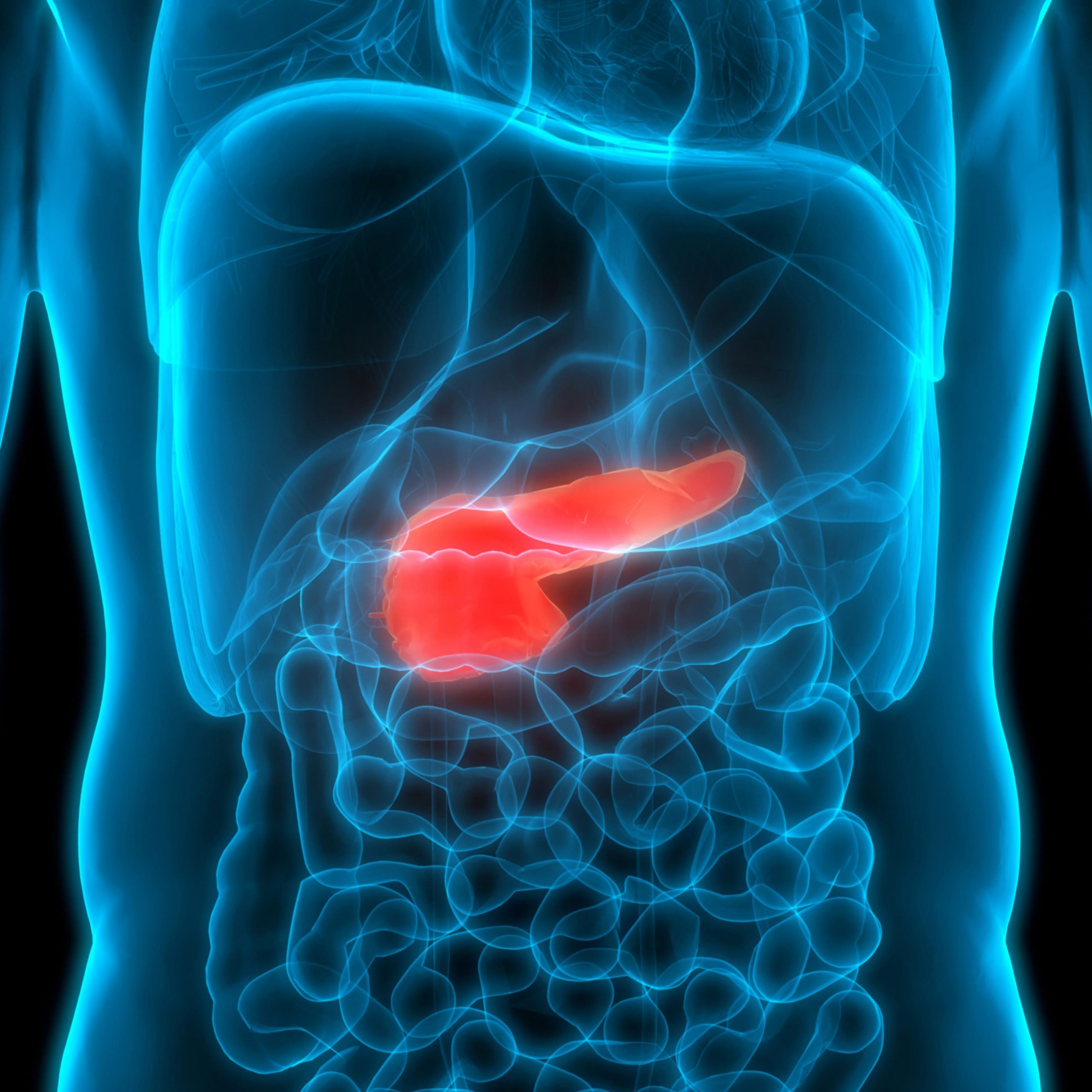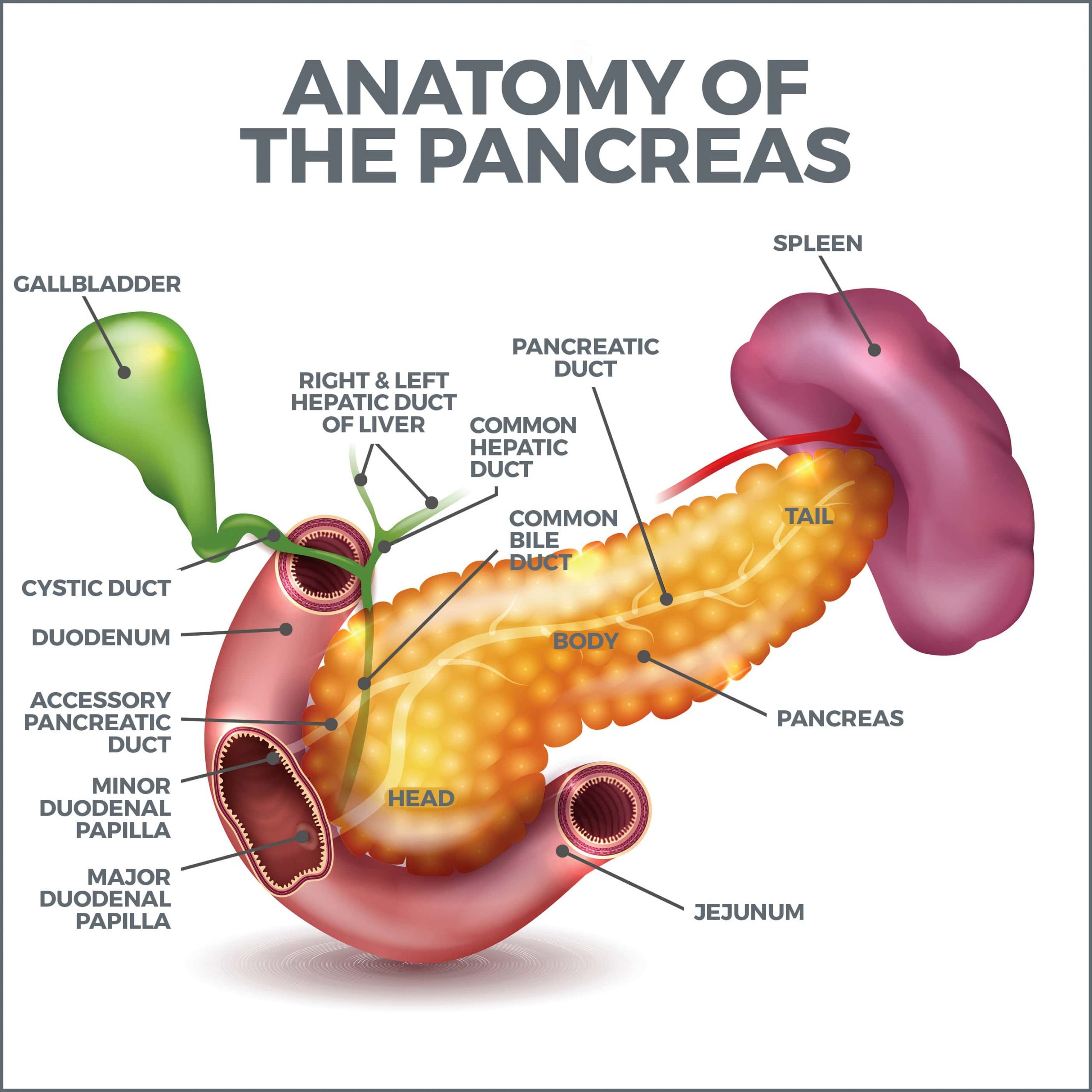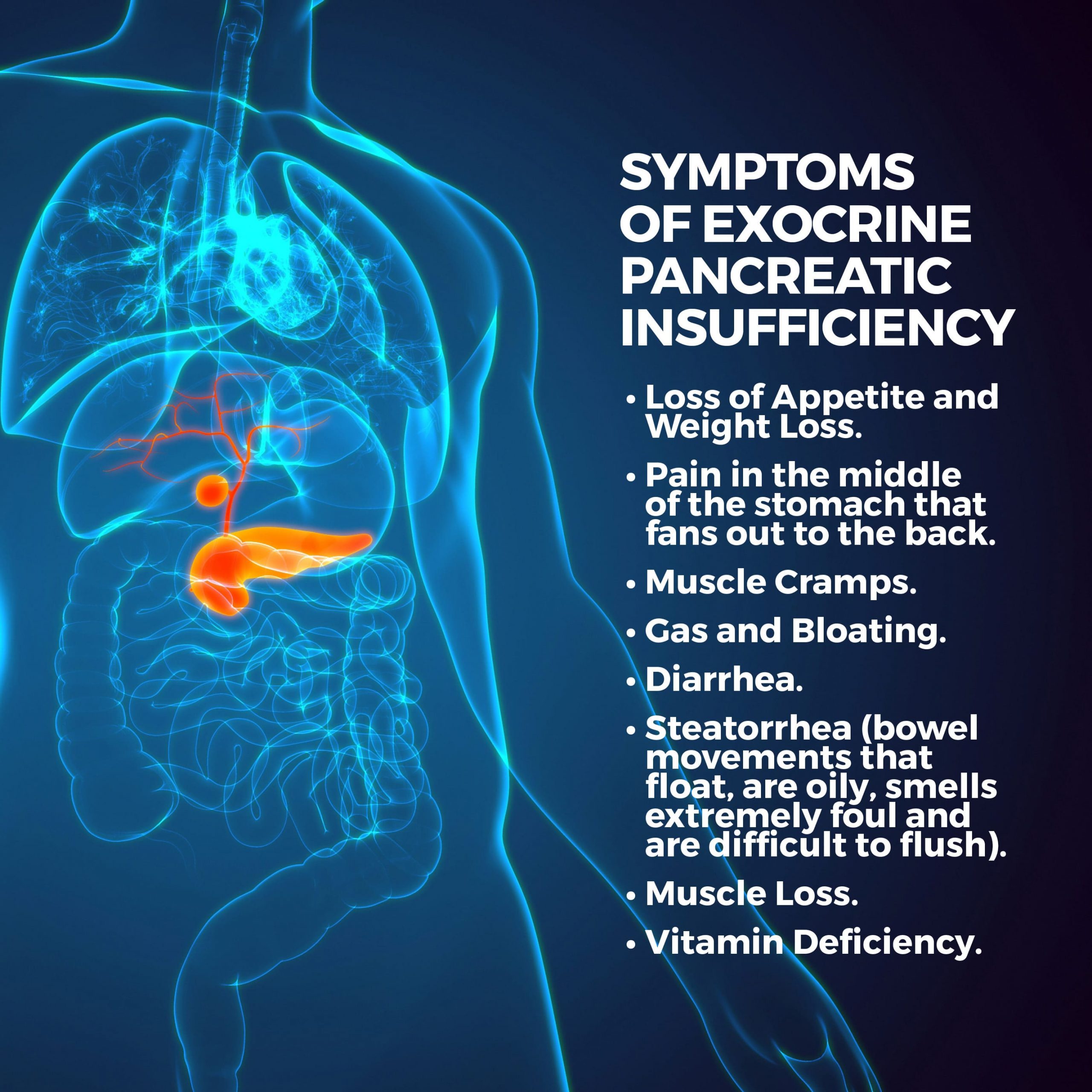
Exocrine Pancreatic Insufficiency
Your pancreas is crucial to digestion because it produces enzymes that break down the food in your small intestine.
If you have exocrine pancreatic insufficiency (EPI), your body can’t adequately digest food, even with a healthy diet. This is due to a lack of digestive enzymes. When the pancreas malfunctions, it undermines the whole digestive process.
What is the Pancreas?
The pancreas is a gland situated behind the stomach. The pancreas is approximately six inches long and resembles a flattened pear. It’s called an exocrine gland because it excretes its enzymes through two ducts rather than directly into the bloodstream.
The pancreas plays a significant role in digestion by producing enzymes that break down fats, proteins, and carbohydrates so that the body can absorb them.
How Does Digestion Work?
When you chew, saliva is released into your mouth, and it softens the food, so it’s easier to swallow. Then the food travels from the mouth to the stomach via the esophagus (food pipe). The stomach releases acids, which further break down the food.
The food progresses to the small intestine, where enzymes produced by the pancreas reduce the food to small molecules. The bloodstream then absorbs these molecules and carries them throughout the body for nourishment.
A functional pancreas releases the correct chemicals in the proper amounts at the right time.

What Enzymes Does the Pancreas Produce?
The pancreas produces three enzymes that are crucial to the digestive process:
- Protease – Protease breaks down food proteins into amino acids, which are then absorbed by the body for nourishment.
- Lipase – Lipase breaks down fats.
- Amylase – This enzyme converts carbohydrates into sugar, which is then transformed into energy.
What Causes Exocrine Pancreatic Insufficiency?
Exocrine pancreatic insufficiency is caused by anything that blocks enzyme release or stops their release altogether. The two most common causes are:
Chronic Pancreatitis condition – where inflammation of the pancreas creates scar tissue. The accumulated scar tissue blocks digestive enzymes from exiting the ducts.
Cystic Fibrosis is a life-threatening, inherited condition that severely damages the pancreas, lungs, intestine, and liver. It causes your body to produce a thick, sticky mucus. In the pancreas, this mucus obstructs the ducts that carry digestive enzymes to the small intestine. Lacking these enzymes, the intestine is unable to absorb nutrients from food.
Other causes include:
- Shwachman-Diamond Syndrome – a rare, inherited disorder in which nutrients are inadequately absorbed because of abnormal pancreatic development.
- Smoking.
- Celiac Disease.
- Crohn’s Disease.
- Diabetes.
- Gastric Bypass Surgery.
- Zollinger-Ellison Syndrome.
A tumor (called a gastrinoma) can cause a rare condition in the pancreas or the first segment of the small intestine (duodenum). Gastrinomas produce excessive amounts of hormones that overstimulate stomach acid production, creating ulcers in the pancreas and duodenum.

What Are the Symptoms of Exocrine Pancreatic Insufficiency?
Consult your doctor if you have one or several of these symptoms:
- Loss of Appetite and Weight Loss.
- Pain in the middle of the stomach that fans out to the back.
- Muscle Cramps.
- Gas and Bloating.
- Diarrhea.
- Steatorrhea.
- Muscle Loss.
- Vitamin Deficiency.
- Watery Bowel Movements – If your digestive system can’t break down nutrients, excess water escapes into the colon. This produces watery bowel movements.
Steatorrhea is a bowel movement that floats, is oily, smells extremely foul, and is difficult to flush. These fatty stools indicate that the pancreas’ fat-digesting enzymes have fallen five to ten percent below normal. Instead of absorbing the fat you eat, your digestive system is excreting it. The result is greasy or oily-looking feces.
Exocrine pancreatic insufficiency can cause weight loss even if you’re eating a decent amount of food. Your body cannot break down the food into useable portions that the digestive system can process, so you’re deprived of the nutrients needed to keep weight on.
If exocrine pancreatic insufficiency prevents the body from properly absorbing food, the body cannot get enough vitamins. You may specifically lack vitamin A, D, E, and K because your digestive tract’s excess fat absorbs them. The vitamins are expelled from your body when the fat is removed.
How is Exocrine Pancreatic Insufficiency Diagnosed?
Several tests can be done to diagnose EPI.
- Blood Tests. Blood tests can determine if you have vitamin deficiencies, fat deposits in your blood, and if your pancreas is producing enough enzymes. Your doctor may also perform blood tests to determine if you have an underlying condition, such as Crohn’s disease.
- Three-Day Fecal Fat Test. This test determines the fat content of your feces and indicates how much fat your body doesn’t absorb. For this test, you’ll need to collect bowel movement samples for three days in provided containers.
- Fecal-Elastase-1. For this test, you’ll collect one stool sample that will be analyzed for elastase, a digestive enzyme produced in the pancreas. Elastase breaks down fats, carbs, and proteins that you eat. In a functional pancreas, elastase passes in your bowel movement. If little or no elastase is present, this can suggest an unhealthy pancreas.
- Endoscopic Ultrasound. An endoscopic ultrasound is two procedures in one. First, the endoscopy uses a scope with a light and a camera to see the inside of the gastrointestinal tract. Next is the ultrasound, which uses high-frequency sound waves. Together, they send detailed images of your GI tract to your doctor via a video monitor.
- Direct Pancreatic Function Test. Although this test is only performed at specialized facilities, it is the most effective means of analyzing the pancreas’ exocrine function. During the test, a tube is inserted into your small intestine to collect pancreatic secretion samples.
CT (computed tomography) scans and MRI (magnetic resonance imaging) scans may also be performed.
How is Exocrine Pancreatic Insufficiency Treated?
The good news is that exocrine pancreatic insufficiency is usually a manageable condition. Here are ways to keep it under control.
Pancreatic Enzyme Replacement Therapy (PERT)
PERT is the typical treatment for exocrine pancreatic insufficiency. Pancreatic enzyme replacement therapy medications contain three pancreatic enzymes; amylase, protease, and lipase. These replace the enzymes that the pancreas lacks or doesn’t release. They help digest carbohydrates, proteins, and fats. They must be taken each time you eat, including snacks.
These medications come in capsule form and are sourced from the pancreas glands of pigs. They are only available with a prescription. The FDA (Food and Drug Administration) has approved the following PERT medications:
- Pancreaze.
- Pertzye.
- Zenpep.
- Ultresa.
- Creon.
- Viokace.
Currently, there are no non-pork alternatives to those used in PERT. If you abstain from pork products because of your faith, PERT has been approved as a medication for Jewish patients by Chief Rabbi Ephraim Mirvis.
For Muslim patients, Dr. A. H. Mohamed, London Central Mosque Trust, maintains that if the physician determines that no other medicines are suitable for curing the disease, the patient can take the PERT medication.
Get Adequate Nutrition
Besides PERT, you will need to eat foods rich in fats, proteins, and carbohydrates. Your doctor will probably have you work with a nutritionist to tailor a healthy, balanced diet specifically for you. Here are general guidelines to keep in mind.
- Steer clear of low-fat diets. You can get healthy fats from foods such as fish, nuts, and cheese.
- Get protein from fish, poultry, and meat.
- Get carbohydrates from bread and pasta.
Also, you should:
- Control Food Portions – Eat six small meals a day instead of three large ones.
- Take Vitamins – You’ll need to replace vitamins A, D, E, and K if they’re not being absorbed from your food.
- Don’t Drink Alcohol to Excess – Heavy drinking can make it even harder for your body to absorb fat and will rapidly damage it.
Contact Us
Contact us today! The team of professionals at GastroMD looks forward to working with you. We are one of the leading gastroenterology practices in the Tampa Bay area. We perform a host of diagnostic procedures using state-of-the-art equipment in a friendly, comfortable, and inviting atmosphere where patient care is always a top priority!



